Latest Updates 
Latest Updates 
To INCULCATE the Global Standards of Excellence in Nurturing the Women Engineers in Building the Bench Mark of Women Empowerment with Acclaimed Technical Education, Research Embedded with Community Orientation Activities.
We at ISTS Committed to:
| Contribution to National Development | New Programs, Courses as per need, Research Innovation Cell, Skill Development Through Industry and academia Linkages, Extension Activities |
| Fostering Global Competencies | Soft Skill Training Competence enhancement for pursuing Higher Studies Entrepreneurial development, Value based Education |
| Inculcating Value System in Students | Foundation Course Yoga, Regional, National Celebrations, Extra-Curricular activities Mentoring System Committees and Clubs (Technical and Non Technical) |
| Promoting Use of Technology | ICT Enabled Classes-Resources e-Learning facilities Results and info in Website and Social Media Participation in National level Competitions |
| Quest for Excellence | Continual Improvement Innovative, Best Practices IQAC – Quality Parameters |
To INCULCATE the Global Standards of Excellence in Nurturing the Women Engineers in Building the Bench Mark of Women Empowerment with Acclaimed Technical Education, Research Embedded with Community Orientation Activities.
We are committed to create quality Women professionals to meet the emerging industrial and social needs through.
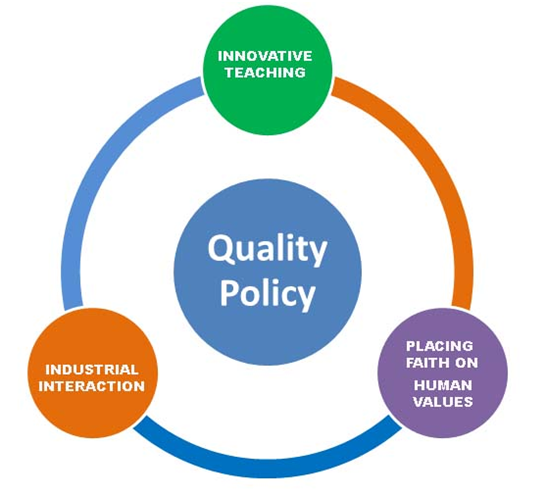
The College consists of dedicated, qualified and experienced faculty and supporting staff in various fields of Engineering. All the staff members meet the requirements as prescribed by AICTE and JNTUK, Kakinada. Various pedagogical activities have been followed by the faculty for the student in order to create interest over the subjects and the developing technologies.
The following are the various teaching methodologies used in different aspects for the delivery of course:
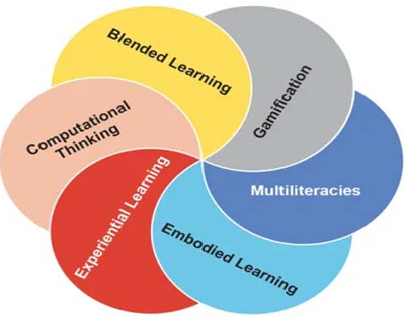
Experiential learning is an engaged learning process whereby students “learn by doing” and by reflecting on the experience. Experiential learning activities can include, but are not limited to, hands-on laboratory experiments, internships, practicums, field exercises, undergraduate research and studio performances.
Well-planned, supervised and assessed experiential learning programs can stimulate academic inquiry by promoting interdisciplinary learning, civic engagement, career development, cultural awareness, leadership, and other professional and intellectual skills.
Learning that is considered “experiential” contain all the following elements:

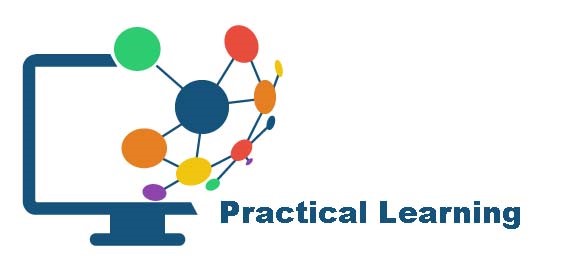
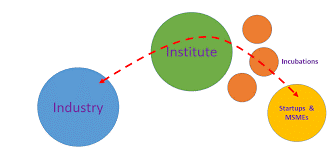
As a professional college ISTS gives the students maximum exposure to the industry to have latest knowledge and information of the area. To make the students acquainted with the industrial working procedure and the practical application of their gained knowledge we organize many programs in association with industries. Different seminars and workshops are arranged which are taken by the professional engineers or experts in the industry. Along with these industrial tours, interaction with industry people etc. is also arranged to make the students aware of today’s industrial needs.
The objective of remedial teaching at ISTS is to give additional help to students who, for one reason or another, have fallen behind the rest of the class in difficult engineering subjects Engg Drawing, BEE, Mathematics etc.
Some of them may be unable to organize their perceptions or to comprehend engineering ideas and concepts. Some may have poor memory, poor level of motivation, short span of attention or associated behavioral problems. Above all, owing to encounters of failure they tend to have low aspirations and low expectations of themselves.
Sometimes most of the learning difficulties of the students in remedial classes are not necessarily student related but are relative to the context where the learning is taking place, such as the family background of the child, parent support and the students’ peer groups.
At ISTS, the remedial faculty understand thoroughly the strengths and weaknesses of these students so that appropriate teaching approaches can be adopted to meet their individual needs. With proper remedial help and the use of stimulating teaching strategies, closer supervision and more individual attention, the students’ interest in learning is aroused and help them make better progress.
The ultimate aim of ISTS remedial teaching is to help students who have fallen behind to learn to the best of their ability and to bring them back into the mainstream classes as soon as possible.
ISTS gives tutorial classes for tough subjects and helps students understand difficult concepts and problems.
The faculty discusses, material from lectures and clarify the student queries on theory and problems. The students solve multiple questions to improve their grasp on the subject. Weak Students are given individual attention in tutorial classes that aid the student in understanding the subject better.
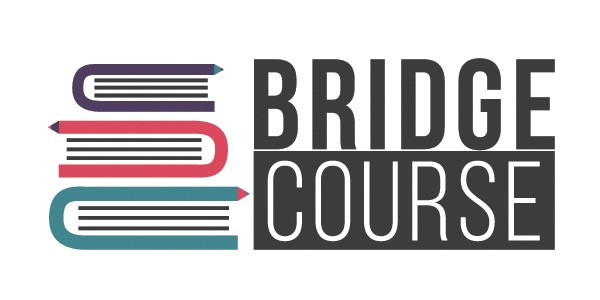
The objective of bridge course is to fill the gap in the curriculum studied by the student. It also includes courses on latest technology that are not part of the current curriculum.
Bridge courses are regularly conducted in ISTS for the Diploma students and some other students to help them understand like mathematics or coding subjects that lateral entry students would have not come across such subjects and find them difficult. The faculty teach these subjects specially for such students and ensure they understand and excel in the exams.
During their four years of journey through the under graduate engineering programme, students often need mentoring, guidance and counselling from a loving elderly figure. Direct academic issues e.g. selection of electives can be easily communicated to the student. But finer nuances e.g. career options or fear of a subject/course need greater involvement of the mentor. Obviously, a student should have the same mentor all through the four years of his journey.
A similar system as discussed above, namely Faculty Advisor exists in this college since 2005. To improve the institute’s present endeavour towards academic quality up gradation in line with NBA/NAAC guidelines, it has become necessary to redefine/reform the existing system. The new system, when practiced diligently will immensely contribute in improvement of the overall academic quality. The students will be greatly benefited by continuous expert guidance.
Mentoring System: The new process has been established as Mentoring System. Each faculty will be the mentor of a group of 20 to 25 students. First year students will have mentors from the department of Basic Engineering & Science and second, third, fourth year students will have mentors from the parent department. Departmental faculties will continue to be mentors for the same group of students till their graduation.
Responsibilities: The mentor will perform the following functions. The list of course cannot be exclusive. A mentor can always do more for the benefit of the students.
Academic committee: Institute’s academic committee will discuss mentoring related issues at least twice in a semester during its meetings and revise/upgrade the system if necessary.
International School of Technology and Sciences for Women is emphasizing towards enhancement of enhancing the institutional ambience to better serve the needs of an ever-changing and dynamic learning community. Effective mentoring begins with the faculty and depends on the healthy relationship between faculty and students. Department assign faculties (acts as faculty advisors) for providing guidance for each year during admission till the graduation for same batch. The faculty advisors perform the following functions:
To maintain personal details of the students including their address, contact numbers, overall academic performance and progress. It will help the Faculty Advisor in monitoring the academic growth of the students. It will also help the College in tracer studies of the alumni.
The faculty monitors their progress and reports to teacher-in-charge. This mentoring is for overall development of the student. Faculty advisor meets the students frequently and discusses various issues including class room lectures, laboratory performances, participation of seminar / conferences and technical event, any academic difficulty faced and career development.
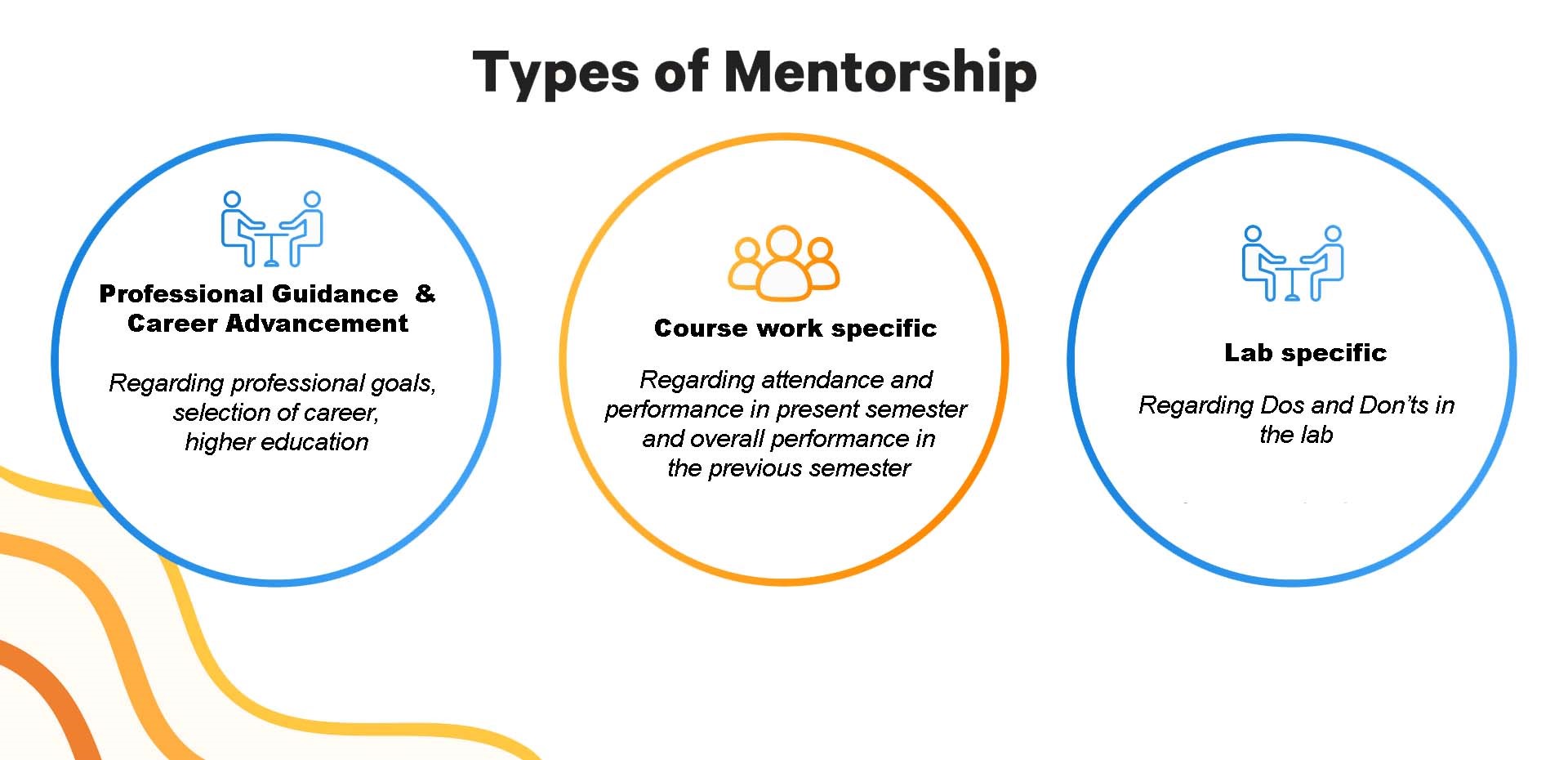
The faculty monitors their progress and reports to teacher-in-charge. This mentoring is for overall development of the student. Faculty advisor meets the students frequently and discusses various issues including class room lectures, laboratory performances, participation of seminar / conferences and technical event, any academic difficulty faced and career development.

| Professional Guidance – | Regarding professional goals, selection of career, higher education. |
|---|---|
| Career advancement – | Regarding self-employment opportunities, entrepreneurship development, morale, honesty, Human Values and integrity required for career growth. |
| Course work specific – | Regarding attendance and performance in present semester and overall performance in the previous semester. |
| Lab specific – | regarding Dos and Don’ts in the lab. |